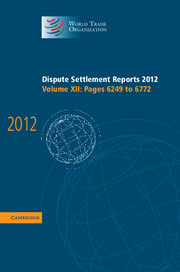Book contents
- Frontmatter
- Contents
- China - Countervailing and Anti-Dumping Duties on Grain Oriented Flat-Rolled Electrical Steel from the United States (WT/DS414):Report of the Appellate Body
- China - Countervailing and Anti-Dumping Duties on Grain Oriented Flat-Rolled Electrical Steel from the United States (WT/DS414):Report of the Panel
- Cumulative List of Published Disputes
China - Countervailing and Anti-Dumping Duties on Grain Oriented Flat-Rolled Electrical Steel from the United States (WT/DS414):Report of the Panel
Published online by Cambridge University Press: 12 December 2017
- Frontmatter
- Contents
- China - Countervailing and Anti-Dumping Duties on Grain Oriented Flat-Rolled Electrical Steel from the United States (WT/DS414):Report of the Appellate Body
- China - Countervailing and Anti-Dumping Duties on Grain Oriented Flat-Rolled Electrical Steel from the United States (WT/DS414):Report of the Panel
- Cumulative List of Published Disputes
Summary
INTRODUCTION
On 15 September 2010, the United States requested consultations with China under Articles 4 of the Understanding on Rules and Procedures Governing the Settlement of Disputes (the DSU), Article XXII:1 of the General Agreement on Tariffs and Trade of 1994 (the GATT 1994), Article 30 of the Agreement on Subsidies and Countervailing Measures (the SCM Agreement) (to the extent that Article 30 incorporates Article XXIII of the GATT 1994), and Article 17.3 of the Agreement on Implementation of Article VI of the General Agreement on Tariffs and Trade 1994 (the Anti-Dumping Agreement) with respect to China's measures imposing countervailing duties and anti-dumping duties on grain oriented flat-rolled electrical steel (GOES) from the United States, as set forth in the Ministry of Commerce of the People's Republic of China (MOFCOM) Notice No. 21 [2010], including its annexes. The consultations were held on 1 November 2010. The consultations failed to resolve the dispute.
On 11 February 2011, the United States requested, pursuant to Article 6 of the DSU, Article 17.4 of the Anti-Dumping Agreement, and Article 30 of the SCM Agreement, that the Dispute Settlement Body (the DSB) establish a Panel to examine this matter.
At its meeting on 25 March 2011, the DSB established a panel pursuant to the request of the United States in document WT/DS414/2, in accordance with Article 6 of the DSU.
The Panel's terms of reference are the following:
To examine, in the light of the relevant provisions of the covered agreements cited by the parties to the dispute, the matter referred to the DSB by the United States in document WT/DS414/2 and to make such findings as will assist the DSB in making the recommendations or in giving the rulings provided for in those agreements.
Following the agreement of the parties, the Panel was composed on 10 May 2011 as follows:
Chairman: Mr John Adank
Members: Mr Anthony Abad
Mr Jan Heukelman
Argentina; the European Union; Honduras; India; Japan; Korea; Saudi Arabia and Viet Nam reserved their rights to participate in the Panel proceedings as third parties.
- Type
- Chapter
- Information
- Dispute Settlement Reports 2012 , pp. 6369 - 6748Publisher: Cambridge University PressPrint publication year: 2014
- 2
- Cited by

